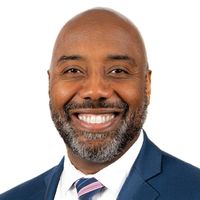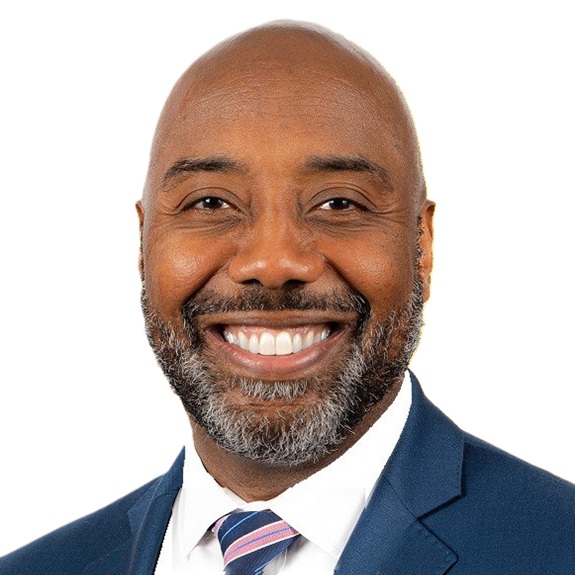A Financial Expert's Three Steps to Becoming Debt-Free (Even in This Economy)
If debt has you spiraling, now is the time to take a few common-sense steps to help knock it down and get it under control.


Profit and prosper with the best of Kiplinger's advice on investing, taxes, retirement, personal finance and much more. Delivered daily. Enter your email in the box and click Sign Me Up.
You are now subscribed
Your newsletter sign-up was successful
Want to add more newsletters?

Delivered daily
Kiplinger Today
Profit and prosper with the best of Kiplinger's advice on investing, taxes, retirement, personal finance and much more delivered daily. Smart money moves start here.

Sent five days a week
Kiplinger A Step Ahead
Get practical help to make better financial decisions in your everyday life, from spending to savings on top deals.

Delivered daily
Kiplinger Closing Bell
Get today's biggest financial and investing headlines delivered to your inbox every day the U.S. stock market is open.

Sent twice a week
Kiplinger Adviser Intel
Financial pros across the country share best practices and fresh tactics to preserve and grow your wealth.

Delivered weekly
Kiplinger Tax Tips
Trim your federal and state tax bills with practical tax-planning and tax-cutting strategies.

Sent twice a week
Kiplinger Retirement Tips
Your twice-a-week guide to planning and enjoying a financially secure and richly rewarding retirement

Sent bimonthly.
Kiplinger Adviser Angle
Insights for advisers, wealth managers and other financial professionals.

Sent twice a week
Kiplinger Investing Weekly
Your twice-a-week roundup of promising stocks, funds, companies and industries you should consider, ones you should avoid, and why.

Sent weekly for six weeks
Kiplinger Invest for Retirement
Your step-by-step six-part series on how to invest for retirement, from devising a successful strategy to exactly which investments to choose.
Eighty percent of Americans are concerned about affordability of everyday living costs regardless of income level, according to consumer research from Equitable.
And that was before the stock market took a plunge and tariffs shot up, both of which could kickstart another period of high inflation.
With key purchases and even necessities increasingly out of reach, going into debt might seem likely.
From just $107.88 $24.99 for Kiplinger Personal Finance
Become a smarter, better informed investor. Subscribe from just $107.88 $24.99, plus get up to 4 Special Issues

Sign up for Kiplinger’s Free Newsletters
Profit and prosper with the best of expert advice on investing, taxes, retirement, personal finance and more - straight to your e-mail.
Profit and prosper with the best of expert advice - straight to your e-mail.
It's incredibly common already: According to TransUnion's Q4 2024 Quarterly Credit Industry Insights Report, American households had an average of $263,923 in mortgage debt, $24,373 in auto loan debt, $6,580 in credit card debt and $11,607 in personal loan debt, not to mention student loans or medical debt.
The Kiplinger Building Wealth program handpicks financial advisers and business owners from around the world to share retirement, estate planning and tax strategies to preserve and grow your wealth. These experts, who never pay for inclusion on the site, include professional wealth managers, fiduciary financial planners, CPAs and lawyers. Most of them have certifications including CFP®, ChFC®, IAR, AIF®, CDFA® and more, and their stellar records can be checked through the SEC or FINRA.
The problem? This debt can spiral out of control as interest payments pile up, making loans more challenging to pay back and credit harder to access. After all, Fortune reports, nearly 1 in 5 Americans have maxed out their credit cards.
According to the New York Fed, almost two-thirds of credit cardholders carry debt month over month, paying an average of 23% in interest — meaning these purchases are ultimately far more expensive than the sticker price.
While it might seem like a tough time to manage debt, the reality is that this is a crucial moment to get it under control. In the long run, handling debt effectively offers financial freedom, flexibility and the ability to weather hard times and enjoy your hard-earned money.
Here's how to get started.
Step No. 1: Avoid unnecessary debt
Steering clear of unnecessary loans might seem obvious, and it may not feel like helpful advice when you're trying to manage your existing debt. But especially when times are tough, it's worth remembering that just because you can access a certain amount of credit doesn't mean you should.
Consider what you actually need vs where you can cut costs.
For example, if you're looking to buy a house in the next few months, you may hear lenders refer to the "30% rule," which recommends that your monthly housing payment should not exceed 30% of your gross monthly income.
If you make $10,000 a month before taxes, you might think this means your budget is $3,000 a month and look at property that fits that price range.
A safer approach, however, would be to set a smaller budget that meets your needs, even if it means not getting everything you may want.
Instead of searching with the maximum allowable budget, look at properties with monthly payments that equal just 20% of your net take-home pay (or about $1,500 in this example, assuming a $7,500 monthly income after taxes).
The extra cash you save by avoiding unnecessary debt will not only give you financial breathing room, but also can enable you to pay back other debts.
Step No. 2: Calculate with clarity
To get a handle on how to repay your debt, you need to know exactly what you owe and when.
Assemble specific information about your balances, the interest rates on your loans and the terms of said loans. Calculate how long it will take to pay off your loans at the minimum monthly amount and how much interest will be paid to the lender under this framework.
If you're able, try to restructure your debt. Work with your lenders to see if you can get a lower interest rate. You should also consider whether consolidating or refinancing your debt saves you interest payments over time.
Once you have this information in hand, prioritize:
- Mathematically, debt with the highest interest rate should be paid down first to minimize the overall amount you will pay in interest.
- Emotionally, you can also consider attacking the debt with the lowest balance first, so you have a quick win to sustain you.
Whichever route you choose, you should calculate how much you are able to put toward repayment every month and commit to that plan.
Step No. 3: Make payments and boost income
Once you've done the calculations and finalized your payment plans, the next part is easy (at least on paper): Pay back your debt.
If you can, look for opportunities to boost your income, too, be it through extra hours at work, side hustles or a part-time job. If you receive bonuses or gifts, resist the temptation to buy something you don't need.
Instead, put that amount toward repayment. And if you're really ready to go the extra mile to become debt-free, you can even consider downsizing your home (including by selling and moving to a cheaper rental) or downgrading your car.
Looking for expert tips to grow and preserve your wealth? Sign up for Building Wealth, our free, twice-weekly newsletter.
Putting even a little extra money toward your repayment efforts each month can make a big difference.
For example, if you have a $10,000 credit card balance with an 18% annual rate, it will take more than 15 years to pay down that amount (and you would pay nearly $19,800 in interest alone) if you paid $160 a month.
But if you paid an additional $50 a month? You would pay off that debt in half the time — a little over seven years — and would save about $12,000 in interest. It adds up.
Remember, whatever amount you pay, make sure it's at least enough to cover the interest.
All too often, people simply pay their card's minimum payment amount without realizing it might not be sufficient to cover the accrued interest. At that rate, they'll never pay off the balance.
Short-term pain, long-term gain
Paying down debt will require short-term sacrifices, and it can take an emotional toll. But when times get tough, just remember: You're securing a debt-free future and your financial freedom.
I promise it'll be worth it.
This article, which has been written by an outside source and is provided as a courtesy by Stephen B. Dunbar III, JD, CLU (AR Insurance Lic. #15714673), Executive Vice President of the Georgia Alabama Gulf Coast Branch of Equitable Advisors LLC, does not offer or constitute, and should not be relied upon, as financial, investment, debt management or legal advice. Equitable Advisors LLC and its affiliates do not make any representations as to the accuracy, completeness or appropriateness of any part of any content hyperlinked to from this article. Your unique needs, goals and circumstances require the individualized attention of your own tax, legal, debt management and financial professionals whose advice and services will prevail over any information provided in this article. Equitable Advisors LLC and its affiliates do not provide tax or legal advice or services. Stephen B. Dunbar III offers securities through Equitable Advisors LLC (NY, NY 212-314-4600), member FINRA, SIPC (Equitable Financial Advisors in MI & TN), offers investment advisory products and services through Equitable Advisors LLC, an SEC-registered investment adviser, and offers annuity and insurance products through Equitable Network LLC (Equitable Network Insurance Agency of California LLC). Financial professionals may transact business and/or respond to inquiries only in state(s) in which they are properly qualified. AGE-7957140.1(05/25)(exp.05/29)
Related Content
- Early 401(k) Withdrawals: Benefits, Risks and Alternative
- A Guide to Debt: Good vs. Bad and Tips to Better Manage It
- 32 Ways to Make Money in 2025
- Need Help Digging Out of Debt? What You Can Do
- Five Side Hustles You Could Turn Into a Full-Time Business
Profit and prosper with the best of Kiplinger's advice on investing, taxes, retirement, personal finance and much more. Delivered daily. Enter your email in the box and click Sign Me Up.

Stephen Dunbar, Executive Vice President of Equitable Advisors’ Georgia, Alabama, Gulf Coast Branch, has built a thriving financial services practice where he empowers others to make informed financial decisions and take charge of their future. Dunbar oversees a territory that includes Georgia, Alabama and Florida. He is also committed to the growth and success of more than 70 financial advisers. He is passionate about helping people align their finances with their values, improve financial decision-making and decrease financial stress to build the legacy they want for future generations.
-
 You Received a Life Insurance Payout. Here's How to Avoid an IRS Audit.
You Received a Life Insurance Payout. Here's How to Avoid an IRS Audit.You received a big check from your loved one's life insurance policy. Will the IRS be expecting a check from you now?
-
 Supreme Court Strikes Down Trump Tariffs: What's Next for Consumers and Retailers?
Supreme Court Strikes Down Trump Tariffs: What's Next for Consumers and Retailers?Tax Law This landmark decision will reshape U.S. trade policy and could define the outer boundaries of presidential economic power for years to come.
-
 Before You Go to Costco, Try This Grocery Strategy First
Before You Go to Costco, Try This Grocery Strategy FirstA simple shift in how you plan meals could help you spend and waste less.
-
 Is Life Insurance Taxable When It's Paid Out?
Is Life Insurance Taxable When It's Paid Out?You received a big check from your loved one's life insurance policy. Will the IRS be expecting a check from you now?
-
 Before You Go to Costco, Try This Grocery Strategy First
Before You Go to Costco, Try This Grocery Strategy FirstA simple shift in how you plan meals could help you spend and waste less.
-
 Are You Making These 3 Savings Mistakes?
Are You Making These 3 Savings Mistakes?Avoiding these common mistakes can help you build a foundation of wealth while not leaving thousands of dollars on the table.
-
 I'm a Financial Planner: This Is How You Can Legally Divorce the IRS for the Rest of Your Life
I'm a Financial Planner: This Is How You Can Legally Divorce the IRS for the Rest of Your LifeWith some careful planning focused on the standard deduction, retirees who have large sums in tax-deferred accounts can avoid unpleasant tax bills and even part ways with the IRS for good.
-
 9 Ways the Wealthy Waste Thousands in Taxes: A Checklist for What Not to Miss
9 Ways the Wealthy Waste Thousands in Taxes: A Checklist for What Not to MissThe tax code contains plenty of legitimate ways for the wealthy and business owners to cut taxes. Use this checklist to minimize taxes and stay compliant.
-
 Stocks Drop as Iran Worries Ramp Up: Stock Market Today
Stocks Drop as Iran Worries Ramp Up: Stock Market TodayPresident Trump said he will decide within the next 10 days whether or not the U.S. will launch military strikes against Iran.
-
 5 Investing Rules You Can Steal From Millennials
5 Investing Rules You Can Steal From MillennialsMillennials are reshaping the investing landscape. See how the tech-savvy generation is approaching capital markets – and the strategies you can take from them.
-
 When Estate Plans Don't Include Tax Plans, All Bets Are Off: 2 Financial Advisers Explain Why
When Estate Plans Don't Include Tax Plans, All Bets Are Off: 2 Financial Advisers Explain WhyEstate plans aren't as effective as they can be if tax plans are considered separately. Here's what you stand to gain when the two strategies are aligned.